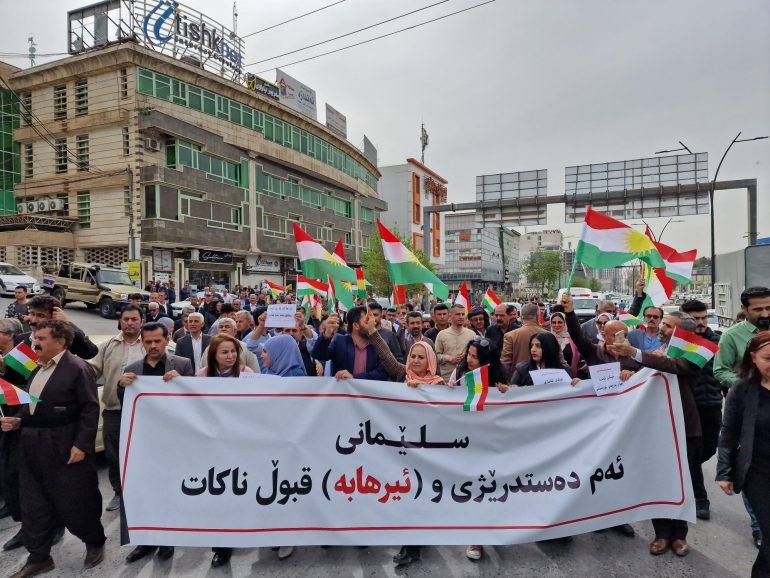Dozens of demonstrators in Sulaymaniyah took to the streets to protest last week’s drone attack on the city’s airport, widely believed to have been carried out by Turkey. The protesters marched from Salim Street, known as Saholaka, towards the east of the city, chanting slogans such as “long live the unity of the Kurdish nation” and “the Kurdish nation is one and united.”
The protest was organized by writers, activists, and former MPs in the Kurdistan Region – with tacit Patriotic Union of Kurdistan (PUK) support.
Carrying Kurdish flags, the demonstrators condemned Friday’s attack on Sulaymaniyah International Airport, which occurred as a nearby convoy carrying Mazloum Abdi, the commander of the Syrian Democratic Forces (SDF), and other US military officials passed by. There were no casualties, with authorities labeling it an “explosion” that caused no “damage.”
“We are gathered here today to express our deepest outrage against Turkey, which once again infiltrated the Kurdistan Region and attacked a civilian location, [an act] considered a war crime,” read the statement from protest organizers.
They called for an embargo on Turkish goods and for Iraq and Kurdistan to summon the Turkish ambassador and consul general, respectively, to “stop these attacks on civilian areas and never breach Iraq’s sovereignty.”
Shanaz Ibrahim Ahmed, the PUK First Lady of Iraq, participated in the demonstration to express her support, emphasizing the importance of raising their voices and supporting each other during challenging times while remaining “united.”
Partisan support and the display of political party flags were prohibited during the demonstration, as organizers sought to present a united front along patriotic lines. The protesters called for unity amid heightened tensions between the region’s two most powerful parties, the Kurdistan Democratic Party (KDP) and the PUK, following the attack.
Though the demonstration received PUK support – partly as a gesture of disapproval towards the KDP – attendance was lower than anticipated.
“It’s disappointing. We expected millions to attend. Perhaps it’s due to Ramadan and people being fatigued,” said Hemn Mamand, a prominent local activist and journalist who helped organize the protest. “The KDP also prevents protests on this issue within its stronghold, which is why turnout was low. Protests should have been staged in the capital of Kurdistan [Erbil].”
In Erbil, the KDP stronghold, security forces closed the office of an organization affiliated with the Kurdistan Workers’ Party (PKK). The Kurdish National Congress (KNK), an umbrella organization representing various affiliated political parties and organizations, attempted to denounce the Sulaymaniyah attack by reading a statement at its office but was thwarted by KDP security forces.
Although Turkish officials have not admitted involvement, the drone strike ignited a bitter exchange between KDP and PUK officials, each blaming the other for causing disarray in government.
Some protesters believe the rivalry between the two parties and their animosity towards one another serve neighboring countries’ interests. Others argue that it demonstrates weakness, potentially leading to larger strikes and breaches of Iraq’s sovereignty.
“As a nation, our division has harmed us more than our enemies. Instead of protecting all cities without discrimination, our government has made some comments that justified the Turkish drone strike. This is unacceptable, and this division is like cancer. We are here to raise our voices so that such attacks are never repeated,” said Omar Kasan, a Kurdish poet and Sulaymaniyah resident who participated in the protest.
Following the suspected attack, KRG spokesperson Jotiar Adel (KDP) released a statement saying the attack resulted from “the occupation of government institutions” used for “illegal activities” in Sulaymaniyah, indirectly pointing the finger at the PUK, which holds sway in the area.
In response, Qubad Talabani, the PUK deputy prime minister, issued a statement strongly denouncing Adel’s remarks, adding the striking assertion that the KRG spokesperson represents not the government but solely the KDP.
“If the attack had happened in any other country, the response would have been much stronger. Unfortunately, we see our government more divided than ever. We are here today to form a consensus so people won’t remain silent on such matters,” said Sharo Shaho, 27, a protester and youth activist.
Shaho believes that the contention between the two parties demonstrates “a weakness” that could lead to further embargoes and possibly more attacks by Ankara.
Immediately after the protest, Mazloum Abdi thanked Sulaymaniyah citizens in a tweet for “showing a strong reaction and stance.
“We have known the people of Sulaymaniyah for protecting the unity of the Kurdish nation and supporting Rojava. We hope that every citizen in the Kurdistan region shows an appropriate attitude against Turkish intervention.”
Speaking to Al-Monitor, Abdi claimed the attack was an assassination attempt on his life without explicitly naming Turkey. However, the Iraqi presidency on Sunday called on Turkey to apologize for the attack, stating that it had no justification to intimidate civilians “under the pretext that forces hostile to it are present on Iraqi soil.”
In a video statement on Sunday, the SDF commander argued that one of the driving forces behind the attack is the upcoming elections in Turkey: “They try to win the elections at the expense of Kurdish blood, targeting the Kurds, and using it as a card in the election campaign.”
Turkey views the SDF as an offshoot of the PKK, while the US considers the militia a partner that helped drive out ISIS in Syria. The Turkish government decided to halt flights to and from Sulaymaniyah to Turkey last week, citing an “intensification” of PKK presence in the city’s airport.
The KDP has strong ties with Turkey, while the PUK maintains a more subtle relationship with Iran. The PUK has recently been open about its ties with the SDF, which has irritated Ankara.
Hemn Mamand argues the harsh exchange of words between the two Kurdish parties is a ploy for the upcoming election campaign. Less a division and more a division of labor.
“I think the PUK and KDP have controlled power together [this way] for more than 30 years,” he added.


